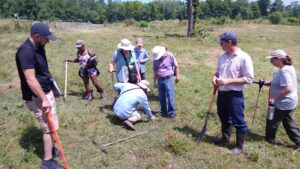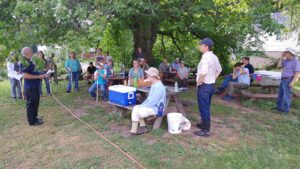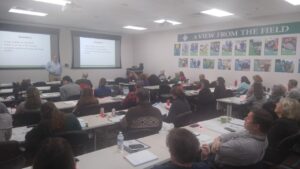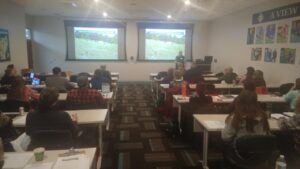Final report for NECT17-001
Project Information
The project was designed to increase the knowledge and skills of agricultural service providers and farmers in Connecticut, Massachusetts and Rhode Island. Topics of priority were identified in a needs assessment sent to the project’s listserv in the fall of 2017. Of the respondents, 34 or 17% indicated that two categories, animal nutrition and pasture management/infrastructure were topics of interest to learn more about. Another 26 or 13% noted that further education was needed in the area of animal health and wellbeing. These three categories comprised the top two choices for both service providers and farmers. The other 8 categories received less than a 9% response rate. The project conducted 17 (9 classroom and 8 field) workshops from 2017-2020. The classroom workshops were held in a central location. Three of the field workshops were held in CT, three were held in MA and two were held in Rhode Island. Monthly correspondence emails from the Project Director kept participants engaged and updated with relevant materials.
The project allowed for the increase of knowledge and skills as they relate to the topics listed above. Some of those areas include: FAMACHA scoring, body condition scoring, forage sampling for analysis, identifying pasture grasses/legumes, weed identification, use of a pasture stick, soil sampling for analysis, pasture renovation vs. improvement, silvopasture practices, types of grazing systems and ways to extend the grazing season (summer annuals, cover crops, stockpiling). The project produced 4 short videos on the topic of body condition scoring, cumulatively receiving 6,855 views as of November 2020. 75 participants in the 2018-2019 field workshops received a pasture stick to take home after learning the proper use of them. The project also produced 3 resource guides containing an array of livestock services (one per state). A Certificate of Participation was provided for those who attended all classroom workshops and at least one field workshop per year. The certificate program was well received with 13 participants receiving a certificate in 2019 and 5 participants receiving one in 2020. The project will build on this program in future grant years.
A total of 79 unique agricultural service providers and 63 unique farmers attended at least one workshop. The yearly follow up surveys indicated that a total of 49 service providers were able to educate 274 farmers (who manage 3,676 animals) on the topics learned through the project. Additionally, 34 farmers indicated that they have made a change/adopted a practice as a result of being involved in the project.
25 agricultural service providers who learn through this project will provide education and assistance (e.g. workshops, meetings, individual consultations, articles, fact sheets) about the recommended sustainable livestock production practices to 200 farmers in CT, MA and RI who manage 4,000 head of livestock (beef cattle, sheep, goats, pigs, chickens).
The project was designed to increase the engagement and thereby, knowledge and skills of agricultural service providers who assist livestock producers in CT, MA and RI as well as farmers in the Tri-State region. Service provider groups included Extension, NRCS, state Departments of Agriculture, Agriscience teachers and animal health care professionals. A needs assessment conducted in 2017 found that further educational programming was necessary in the area of animal nutrition as it relates to health and wellbeing, pasture management and nutrient management decisions. Over the three-year period, multiple delivery methods were employed allowing participants to gain knowledge and skills in several learning environments, including classroom and field training workshops. Online access to presentations and frequent email communication was also made available to those involved in the project. Group discussions allowed agricultural service providers and farmers to discuss action steps they could take, giving them the opportunity to consider developing action plans. Many action steps were discussed, including: developing a working relationship between service providers and farmers, forage sampling and testing, body condition scoring, fecal egg counts, use of a pasture stick, performing forage calculations, controlling weeds in a pasture, soil testing, and grass seed selection. Workshop evaluations and follow up surveys conducted throughout and after the completion of the project verified that participants utilized those action steps.
Advisors/Cooperators
Educational approach
A variety of educational delivery methods will be employed over the course of the three year project. Classroom workshops, held in one central location (among the three states) will be presented as a series, each one building on the previous. Three classroom workshops will be planned and held each year, in conjunction with three field training workshops for a total of 6 workshops per year and 18 workshops over the course of the three year project. The field training workshops will help to reinforce the concepts taught in the classroom and will provide a hands-on educational approach to learning. Online access to presentations, frequent email communication and updates and an online platform allowing for discussion and conversation will also be available to those involved in the project.
Content area specialists will be invited to speak at the workshops to share their knowledge and skills with the participants. Those invited to speak include: veterinarians, faculty and staff from the Universities of Connecticut, Massachusetts and Rhode Island, Extension educators, and private industry consultants.
Workshops will include action planning sessions, where service provider participants discuss ideas for teaching and advising farmers about the content and recommendations and identify at least one action step for doing so.
All workshops will be announced via the project website (www.meatsystems.uconn.edu) and the project mailing list. All workshops are open to service providers and farmers in CT, MA and RI. Advisors to the project will also share information regarding this project through their email lists. Workshop materials as well as other applicable information will be posted to the project's website.
Milestones
450 agricultural service providers receive an online survey that assesses their learning needs and priorities related to sustainable livestock production practices. This assessment will determine the topical area(s) of focus and what the project structure will be for the 2017-2020 project.
450
25
48
January 31, 2018
Completed
January 17, 2018
An online needs assessment, conducted using Qualtrics software was sent to the Tri-State Project's email list (approximately 450 people). 73 people total participated in the needs assessment (48 service providers and 25 farmers).This assessment helped determine the areas that agricultural service providers (and farmers) feel they need further training in. Those areas were found to be: nutrition, health and well being, pasture management/infrastructure and nutrient management. The assessment also determined the distance participants would travel for a workshop, the optimal length of the program, and the type of programming that would be most beneficial for the project. It was determined that classroom workshops can be held in one central location, allowing each one to build on the content and skills taught in the previous workshop. Field training workshops will be held in each state, each one providing hands-on application of a portion of the content taught in the classroom. All workshops will be half day programs.
11 advisory group members provide feedback and advice to the project director via conference calls, email communication and telephone calls. This will help to determine the specific training and educational needs of those involved, as it relates to the feedback received in the needs assessment conducted in milestone 1. Topical emphasis, project curricula, project structure and training tools will be discussed. This group will also be consulted throughout the year when feedback on workshops and suggestions for improvement are being solicited.
11
12
October 31, 2018
Completed
October 31, 2018
The 11 member advisory group was consulted after the needs assessment results were quantified and analyzed. A conference call among the majority of the group members was held in February 2018. Discussion included a recap of the needs assessment findings, the project focus and structure (in particular for year 1), topical areas of emphasis, and a conversation about best practices for adult learning. Individual phone conversations took place with all of the remaining members who weren't able to be on the conference call.
In the months preceding the first workshop in May, advisory group members were contacted through email to solicit input and suggestions on content area specialists who could speak at workshops. All members have also helped to share information about the upcoming 2018 workshops with those they feel would benefit from attending.
The Project Director followed up via email with all of the advisory group members who attended each workshop (6 total). They were asked to provide their feedback and thoughts on the workshop, including but not limited to things such as: the structure/flow of the workshop, the part of the workshop that left the most room for improvement, the part of the workshop they thought was most engaging and if the group discussion accomplished its intended purpose. This feedback was utilized by the project director throughout the year to make changes to the remaining workshops planned for the year.
In October 2018 the Project Director organized a conference call with the 12 member advisory group. The purpose of the call was to review the plans that the Project Director has created for year 2 of the project. Feedback was solicited from the members on the proposed topics for year 2. The Project Director also asked for suggestions of content area specialists who might speak well to any of the topics as well as farms in the CT, MA and RI area (employing these topics) that may be interested in hosting a workshop for the project. Individual phone conversations took place with all of the remaining members who weren't able to be on the conference call.
*Please note that a member was added to the group part way through the year. Hence, what started out as an 11 member group finished as a 12 member group by the end of 2018 year.
450 agricultural service providers receive an announcement describing the new SARE tri-state sustainable livestock education project: Nutrition's Role in Sustainable Livestock Production Practices. The announcement includes an invitation to provide feedback to the Project Director including comments, interests or suggestions as they relate to the project. Moving forward throughout year 1, planned workshops will be promoted and advertised on the project website (www.meatystems@uconn.edu) and with the help of agricultural service provider publications.
450
462
February 28, 2018
Completed
February 27, 2018
A follow up email to the needs assessment, included an announcement sent to the Tri-State Project email list (approximately 450 agricultural service providers and farmers). The announcement included a brief summary of the needs assessment findings, the title of the project and the topics of focus for the project, through 2020. All recipients were invited to look at the project website for more information about workshop dates and were also invited to provide input and advice as it related to the topics of focus for the 2017-2020 project. The project director received only a small amount of feedback, most of which embraced the excitement of the new project focus.
30 participants (agricultural service providers and farmers) respond to an invitation announcement, register and attend a series of 3 half-day classroom workshops that will be held in a central location. These workshops will allow for the increase of knowledge and skills in livestock nutrition; and allow for the understanding of the relationship between nutrition and the health and well-being of livestock. At each workshop, participants will engage in small group discussions to generate ideas for teaching and advising farmers about the content learned in the workshop. Participants will develop at least one action step to help farmers with this area of nutrition. All participants will also be asked to respond to a questionnaire to assess their learning at the conclusion of each workshop. (by October 2018)
30
14
32
October 31, 2018
Completed
July 31, 2018
In April, a formal announcement containing all three workshops dates was distributed to the Tri-State Project email list, the 11 member advisory group and numerous other agricultural organizations throughout Connecticut, Massachusetts and Rhode Island. 2018-sare-workshops This announcement also gave the recipients the option to register for any/all of the dates that they wished to attend. 47 persons registered for one or more of the classroom workshops. A separate reminder announcement was sent approximately 2 weeks in advance of each of the upcoming workshops. The dates of the three classroom workshops in 2018 were: Friday May 18th, Thursday June 21st, and Tuesday July 31st. All three workshops were held in a central location at the Farm Credit East Office in Enfield, CT.
1st classroom workshop: May-18-2018-agenda
This workshop, titled Basic animal nutrition and its impact on animal health featured two content area specialists (May-18-2018-workshop), an instructor at UConn who teaches courses in animal nutrition and an independent nutritionist and consultant. Topics covered included simple animal nutrition concepts and the link between animal health and nutrition. A group discussion held after the presentations was engaging, with nearly all attendees offering some input. Several steps were discussed that agricultural service providers can take action on. Those steps included: start by encouraging more farmers to develop a relationship with agricultural service providers - many farmers tend to form their own circles and don't often solicit help. This relationship will take time to build, but fostering it first is an essential step to the end result of helping farmers become more efficient and sustainable. Another step that was discussed would be helping farmers take feed and forage samples and subsequently helping them understand the importance of doing so explaining and interrupting test results and comparing samples. Twenty-one (21) persons registered and 15 attended: 4 extension educators; 8 ag service providers; and 3 farmers. Eight persons completed on-site evaluations; 6 reported an increase in knowledge of the topics; 2 reported no change in understanding but were already knowledgeable about the topic. Seven (7) of 8 reported that they were already working to learn about animal nutrition and using knowledge with farmers, or that they intended to do so in the next year.
2nd classroom workshop:June-21-2018-agenda
This workshop, titled Sustainably Feeding Animals and the Use of Body Condition Scoring to evaluate animals, featured three content area specialists (June-21-2018-workshop). An instructor at the Stockbridge School of Agriculture, UMass spoke about the concept of feeding animals sustainably. A large animal veterinarian and the Executive Director for the Northeast Pork Association discussed the evaluation of beef cattle, sheep, goats and pigs using body condition scoring. A group discussion, held after the presentations was constructive in developing actions steps (above those mentioned in the previous workshop) that may be taken by agricultural service providers as well as farmers. Action steps included speaking with farmers to understand what their goals are first and then providing them with the tools and education they need to reach their goals. Another step was to determine if the farm/farmer understands the meaning of sustainability, and subsequently determine what their sustainability definition is and how they measure it within their operation. Yet another step was to work with farms to help them implement the use of body condition scoring on their farm. Fifteen (15) persons attended: 5 extension educators; 6 ag service providers; and 4 farmers. Eleven (11) persons completed on-site evaluations: 6 reported an increase in understanding of sustainable feeding practices; 5 already had considerable knowledge and were unchanged. Ten (10) of 11 reported considerable understanding of Body Condition Scoring. Five (5) persons said they were already learning about sustainable feeding practices; were encouraging the use of body condition scoring; and were discussing those practices with farmers and ag service providers. The other 6 persons noted that they would plan to do both of these in the next 2 years.
3rd classroom workshop: July-31-2018-agenda
This workshop, titled Enhancing Animal Health and Well-being through Nutrition, featured three content area specialists (July-31-2018-workshop). All three specialists were educators, one extension personnel from CT, while the remaining two were professors at the University of Rhode Island. Topics covered included the following: common diseases affecting livestock as a direct result of nutrition, parasite control through proper nutrition (in particular when grazing small ruminants on pasture), and proper nutrition during gestation-its effect on the animal and her offspring. This workshop was also voice recorded from start to finish and is available to those who wish to reference it on the project website. The workshop allowed for discussion groups to form on the diseases presented. Participants were broken up into small groups and were given some information and they needed to work together to determine what disease was ailing the particular specie they were assigned to. As with the previous classroom workshops this year, a group discussion was held after all presentations. Every person who was in attendance at the workshop voluntarily spoke during the discussion. It allowed for dialogue among the participants throughout the discussion, some of which continued after the workshop had concluded. During the discussion, the following steps were mentioned as potential actions to take in order to help improve animal health through proper nutrition. 1. Perform a fecal egg count on small ruminants when grazing during the summer months. 2. Encourage farmers to join agricultural clubs/groups so that they can learn from others around them and also be included on listservs where they will be notified of other workshops/seminars they can attend to hear content area specialists talk. 3. Help farmers test their forages so that they know exactly what their animals are getting and what else they might need (this step was mentioned in the first classroom workshop as well). Sixteen (16) persons attended the workshop: 7 farmers; 5 ag service providers; and 4 Extension educators. Eleven (11) persons completed on-site evaluations; all reported moderate to considerable knowledge of common diseases of animals that are directly influenced by nutrition; at completion 8 reported increase to maximum understanding of parasite control through nutrition and increase in understanding of physiological stages and nutrition. All respondents are either already working with farmers or plan to in the next year on these topics.
30 agricultural service providers and farmers will receive an invitation announcement, register online as a participant and attend at least one of three half day field training workshops – one to be held in each state - that will highlight the recommended practices taught in the classroom workshops, including feedstuff analysis, body condition scoring, and pasture rotation to control parasite activity. This will allow for continued learning and further discussion about the topic and farmers' perspectives related to it.
30
15
23
October 31, 2018
Completed
October 12, 2018
In August, a formal announcement field-workshops-FLYER containing all three field workshop dates was distributed to the Tri-State Project email list, the 12 member advisory group and numerous other agricultural organizations throughout Connecticut, Massachusetts and Rhode Island. These dates were listed on the project's website and online registration form prior to August, allowing many to sign up several months prior to the distribution of the formal announcement. Reminder announcements were sent approximately 2 weeks in advance of each of the workshops in an effort to remind those who are interested in attending and have not yet registered. The dates and location of the three field workshops in 2018 were: Friday August 17th at the UMass Amherst Hadley farm, Monday September 10th at UConn's Livestock unit, and Friday October 12th at URI's Peckham Farm.
1st field training workshop: UMass-field-training-Aug-17th-agenda
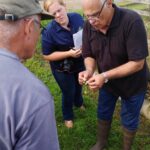
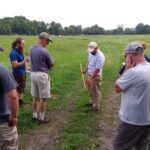
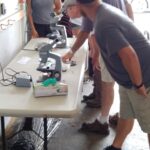
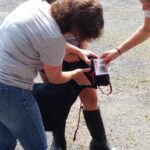
This workshop focused on parasite control in small ruminants. The workshop included a brief discussion with one of the project's advisory group members, Masoud Hashemi, who spoke about grasses and legumes commonly found in New England pastures and the differences in them. The livestock barn manger provided a tour of the pastures demonstrating the rotational grazing system UMass utilizes to control and reduce parasite activity in sheep and goats. A discussion was had while in the field that allowed all participants to discuss their pasture set up and what works best for them. A hands on demonstration of performing a fecal egg count was also conducted as well. The process of taking the sample, followed by preparing the sample and then looking at it under a microscope was demonstrated to all participants. FAMACHA scoring was also performed as an exercise during the workshop. The technique was demonstrated and those participants who wanted to try it could. There was discussion about how to keep the score card in acceptable condition and some tips for successful scoring was shared, including performing the scoring in natural light, scoring both eyes and making a decision quickly and positively so that the membranes aren't exposed to air for an extended period of time. Both fecal egg counts as well as FAMACHA scoring are essential to managing parasite activity in small ruminants.
Fifteen (15) persons registered for the workshop and 15 attended: 1 ag service provider, 5 extension educators, 7 farmers and 2 students. Six (6) persons completed on-site evaluations: 5 of them reported increase in understanding to considerable following the workshop. Five (5) of the 6 stated they planned to continue to learn about parasite control in pasture, and to work with farmers to use information on their farms.
2nd Field Training Workshop UConn-field-training-Sept-10th-agenda
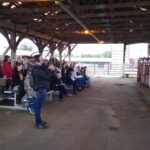
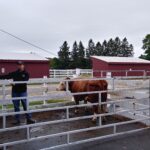
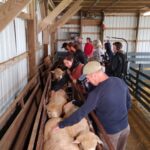
This workshop focused on body Condition Scoring (BCS) of beef cattle and sheep. The workshop was led by Dr. Scott Morey, DVM from Fenton River Veterinary Hospital in Tolland, CT. Dr. Morey started out the workshop by discussing the importance of BCS and how it can be utilized as a management tool on farms. He also discussed how BCS can aide in determining an animals nutritional status which directly relates to health and well being of the animal. The workshop included instruction on the BCS point system for both animal species and the areas on the animal to evaluate and touch. There was also opportunity for hands on participation by the participants. A videographer was present and two short videos were produced on BCS beef cattle and sheep. The completed videos have now been circulated to the entire Tri-State SARE list, are available on the project website, and are also on the Extension websites of each of the Universities involved in the project. Time was allocated for in the agenda for questions and answers as well as group discussion. Many of the participants took advantage of this time by asking questions and engaging with other participants.
Thirteen (13) persons registered for the workshop and 12 attended: 3 ag service providers; 6 extension educators; and 3 farmers. An additional 25 UConn students attended. Four(4) persons completed on-site evaluations and 3 reported an increase in their understanding of the topics; the 4th reported already knowing about these topics. All reported they would utilize body condition scoring in the future.
3rd Field Training Workshop URI-field-training-Oct-12th-agenda
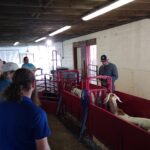
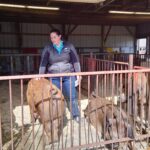
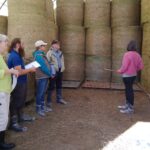
This workshop focused on BCS goats and pigs as well as forage sampling and analysis. Led by URI's Farm Manger and the Executive Director of the Northeast Pork Association, the participants learned the importance of BCS and the role it plays in determining the nutritional status of an animal. Participants were taught the techniques of BCS both goats and pigs. There was also opportunity for hands on participation by those who attended. A videographer was present.Two short videos were produced on BCS goats and pigs. These two videos along with the videos on beef cattle and sheep have now been circulated to the entire Tri-State SARE list, are available on the project website, and are also on the Extension websites of each of the Universities involved in the project. Joyce Meader, a dairy and livestock Extension Educator at UConn led the forage sampling and analysis discussion. Participants were shown the methods employed to take a uniform hay sample as well as how and where to send the sample out for analysis. There was also discussion of forage quality and the role it plays in the amount of forage an animal can digest, as a percentage of body weight.
Twenty-one(21) persons registered for the third field workshop and 13 attended: 3 ag service providers, 5 extension educators, and 5 farmers. Six (6) persons completed on-site evaluations: all reported an increase in their understanding of how to perform body condition scoring on pigs and goats. All reported that they had done body condition scoring on their own species and 4 reported that they would be testing forages that they feed.
30 agricultural service providers receive frequent email updates about the project and will be provided with a way to discuss and share questions, challenges, successes and progress towards action steps via an online forum, conference calls or any other mode proven to be effective with the group.
30
19
31
October 31, 2018
Completed
October 31, 2018
After getting an understanding of how the group wanted to maintain contact in between workshops, the project director created a contact list of those participants so that communication could be maintained via email. The goal was to connect with all those who have participated in any of the classroom or field training workshops. This contact list also included the advisory group. Once established the project director emailed the group on average once per month. Each email contained at least one reference (article, website etc) that directly related to the project.
The first email, sent in July, contained a link to the UC Davis Agricultural Sustainability Institute website. This website had some basic sustainability information and contained many examples and ways in which farms can work towards becoming more sustainable. These examples tied in directly with a portion of the group discussion from the 2nd workshop, (June 21st) when the participants spoke about determining how the farmer/farms they work with define sustainability, recognizing that every farm may have a different approach to sustainability.
The second correspondence, sent in August, provided references (articles and a website) for parasite control in small ruminants. This topic was one of the three topics covered in the last classroom workshop (July) of the year and the first field training workshop (August) held at UMass.
Correspondence sent in September provided links to two articles that related to many of the topics discussed this year, including: proper nutrition based on the life stage of the animal, body condition scoring and fetal programming as a result of maternal nutrition. These articles provided a re-cap for those participants who were introduced to the concepts at the workshop(s) and a good introduction for those who may have missed a workshop that related to one of these particular topics.
In October, the project director provided information on two topics, both of which were discussed at the October field training workshop. The first, was a link to a website discussing BCS goats. This information is beneficial to those who weren't able to attend and those who did attend but may be looking for more information to expand their knowledge and further develop their skills. The second link provided was an article which illustrates the importance of testing forages and what those tests tell you about the forage quality. The importance of testing forages can't be overlooked, managing your animals nutrition accurately depends upon knowing the quality of forage they are receiving.
In November, the link to the final body condition scoring videos, (filmed during the field training workshops) was made available to the group. There was a total of four videos, each focusing on one of the following animal species: beef cattle, goats, pigs and sheep. The group was encouraged to utilize and share these videos in anyway they see fit. Be it with clients, other farmer friends, or at future workshops they participate in.
All participants from the 6 workshops respond to a follow-up survey from the Project Director. Agricultural service providers will report on actions taken to teach and advise farmers using new knowledge and skills from the workshops conducted in year 1 while farmers will report on what meaningful changes they have implemented on their farm. Both are expected to give input about future training needs.
30
6
13
March 31, 2019
Completed
March 26, 2019
The Project Director distributed a follow up survey (V3-Yr.-1-follow-up-survey-questions) to both the service providers as well as the farmers who participated in at least one of the six workshops in 2018. The survey was anticipated to take about 5 minutes of time and the participants were given two weeks to respond (April 10th). The follow up survey created for the service providers was distributed to 25 people, while the follow up survey created for farmers was distributed to 14 people. Responses were received from 13 service provider and 6 farmers, an overall response rate of 49%. Data from the surveys is reported in the performance target section.
The advisory group members provide feedback and advise the project director via conference calls, email communication and telephone calls. This will help to determine the specific training and educational needs of those involved, as it relates to the feedback received in the questionnaire forms filled out at all workshops in year 1 of the project. Topical emphasis, project curricula, project structure and training tools will be discussed. This group will also be consulted throughout the year when feedback on workshops and suggestions for improvement are being solicited.
11
11
September 30, 2019
Completed
September 20, 2019
The Project Director contacted the advisory group members in September 2018 in preparation for the 2018-2019 grant year. All members were asked if they were still interested in being a part of the group and to choose a day/time for a conference call to begin year 2 planning. One of the 2017-2018 members decided to step away from the group, as he felt he didn’t have the time that was necessary to actively participate. A conference call was scheduled for October 1, 2018 to begin the 2018-2019 planning with the now 11 member group. Much of the discussion focused on the year 2 curriculum. Two of the advisory group members who work directly with the year 2 topic (pasture management and infrastructure and the nutritional needs of animals raised on pasture) offered to help outline the 3 classroom workshops and provide suggestions on topic flow/order. During the conference call, the Project Director also asked the group for recommendations and contact information of individuals who could speak well to the topics of focus in year 2. In December 2018, the advisory group was contacted in an effort to find an individual who would speak well to a specific topic the Project Director still needed coverage for. With the help of a few group members and some networking, the Project Director secured the final speaker needed for the 2019 workshops. In January 2019, the group was contacted again and asked to give their feedback on Certificates of Participation. With the positive response, the Project Director decided to push forth in designing a list of requirements that participants would achieve in order to receive a certificate. In April 2019, the Project Director shared the printable announcement of the field training workshops that were planned for the summer months with the group and asked them to share the workshops with those who may be interested in attending. In July, the Project Director reached out to each of the group members individually, via email and telephone to discuss with them potential topics for training in the 2020-2023 grant cycle. This was in preparation for a discussion among each of the three universities involved in the project. In September, the Project Director scheduled a conference call with the advisory group to wrap up the grant year and discuss the curriculum for the upcoming grant year. Discussion was had about the topics of focus for the 2020 workshops as well as industry professionals who would speak well to the slated topics and farms who may be open to hosting a field workshop for the project. There was also discussion that looked beyond this three year grant including potential topics of learning for another three year grant period and the timeline for submission of the proposal.
450 people (agricultural service providers and farmers) receive an announcement describing the classroom workshops planned for year 2 of the Tri-State SARE professional development project; Nutrition's Role in Sustainable Livestock Production Practices. The announcement includes an invitation to provide feedback to the Project Director and the opportunity to register for one or all the workshops. Moving forward throughout year 2, planned workshops will be promoted and advertised on the project website (www.meatystems@uconn.edu) and with the help of agricultural service provider publications.
450
458
January 31, 2019
Completed
January 14, 2019
An announcement for the three classroom workshops planned for 2019 was sent to the Tri-State Project email list (458 recipients) in January 2019. The three classroom workshops were planned for February, March and April. They were held from 8:30 am to 1 pm at Farm Credit East in Enfield, CT. Each workshop had specific topics of focus and were structured in such a way that the first built on the second and the second on the third following a logical sequence. The workshops can also be attended as stand alone workshops, in the event someone felt they need training in only one specific area. The announcement provided the dates and topics of the three workshops as well as a link to register for any or all of the workshops. workshops_announcement_flyer.
Moving forward throughout the year a reminder email was sent approximately 1 to 2 weeks in advance of each workshop to all those who registered. In addition to the reminder details, the email also provided the names of the speakers and a short biography of each. All of the announcements sent via the listserv were also posted to the meatsystems website.
A series of three half day classroom workshops will be held in a central location. These workshops will allow for the increase of knowledge and skills in livestock nutrition, as it relates to sustainably feeding animals. Specific focus will be on pasture feeding methods, management and infrastructure. 30 participants will attend each classroom workshop. At each workshop, participants will engage in group discussions to generate ideas for teaching and advising farmers about the content learned in the workshop. Agricultural service provider participants will develop at least one action step to help farmers with this area of nutrition, while farmers will be asked to determine what of the concepts learned can apply to their own situation. All participants will also be asked to respond to a questionnaire to assess their learning at the conclusion of each workshop.
30
22
30
July 31, 2019
Completed
April 29, 2019
1st classroom workshop February-11-2019-agenda
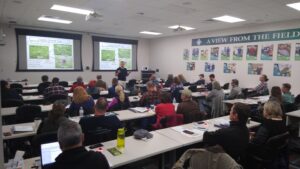
This workshop, titled Improving existing pastures and establishing new pastures, featured three content area specialists (February 11, 2019 workshop). An Extension Professor from the University of Maine spoke about pasture plants. A Consulting Conservation Scientist from the University of Connecticut discussed soil health and an Extension Field Specialist from the University of New Hampshire discussed existing pasture care and reseeding new pasture. A group discussion, held after the presentations was constructive in developing actions steps that may be taken by agricultural service providers as well as farmers. Action steps included building and/or working off of the already existing agricultural services list for each state to provide a "resource guide" to ag service providers and farmers. Among other services, the guide would provide the names and contact info of companies that rent equipment or provide custom services for (re)seeding pasture and pasture care (i.e. drill seeder, sprayer etc). Another action step was for those in the room (ag service providers and farmers alike) to share the information learned in the workshop with the people and groups they are involved with. One attendee mentioned that she was going to share all of the information and handouts with members of a goat producers group in Connecticut. One other action step mentioned was to take the information learned and apply it to a hands on situation in the field. The attendee hoped to be able to identify pasture plants and weeds with ease so that they could share their knowledge when working with others. Yet another action step discussed was to check for soil compaction on the farm with the use of a shovel. Moving to different areas on the farm and determining how easy it is to dig the shovel into the ground, would help determine the extent of soil compaction present. New this year, the project utilized Turning Point Technology to conduct the on site evaluations/surveys in the classroom. Through the use of clickers, the participants were engaged in a much more interactive process to help determine their knowledge of the topics presented both before and after the presentations. The clickers were well received by the group and provided greater and more complete response rates over the previous paper evaluations. 46 persons registered and 37 attended. 19 ag service providers and 18 farmers. 27 persons completed on-site evaluations. 10 reported a considerable increase in knowledge to maximum understanding in the role that soil plays in forage quality. 13 reported an increase in knowledge in the area of caring for already existing pasture. 17 reported an increase in understanding of how to reseed new pasture, where 8 reported a nonexistent understanding of this topic prior to the start of the workshop. 15 reported a knowledge increase in understanding the basic fundamentals of pasture plants. 26 reported that they plan to continue learning about improving existing pastures and establishing new ones. 21 persons said they plan to integrate these topics into their everyday work, while six (6) reported that they were already integrating these topics into their work.
2nd classroom workshop Mar-11-2019-agenda
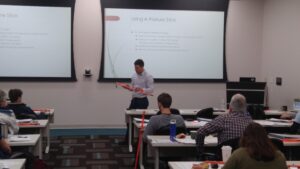
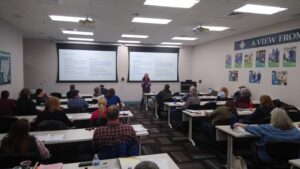
The workshop, titled Properly managing your existing pasture, featured two content area specialists (March 11th 2019 workshop). A Grazing Specialist from UVM's Center for Sustainable Agriculture spoke about grazing management as well as pasture design and infrastructure. The Farm Manager from the University of Massachusetts discussed the proper use of a pasture stick as well as forage calculations. Many in attendance were engaged and asking questions both during and after the presentations. This engagement continued into the group discussion where feedback was given by both service providers and farmers. Conversation included ways to teach others what was learned in the classroom. When asked how those in the room planned to do so, some interesting points were brought up. One service provider (USDA FSA) said that she (and others she works with) knows there is a population of people who could benefit from the information learned but she struggles to connect with them. She finds that the group of people she thinks would benefit most, tend not to be open to working with government agencies. In response to that, a 4th generation farmer in the room said that in her situation that thought process hinges on which generation the service provider "targets". She mentioned that some of the previous generations on her farm aren't open to these discussions. Her opinion was that in time service providers will see a change in mindset as the younger generations are willing to work and build relationships with service providers (government or otherwise). Some action steps discussed included putting "your pencil to paper" to work out some of the forage calculations that were taught and walking through your pasture on a dewy morning. If after crossing the pasture your boots are still dry, it is time to make some pasture management changes. Another step discussed was to get out into the pasture and practice the concepts learned (use of a pasture stick) in a hands on way (the participants were reminded again that 3 field training workshops will follow the classroom workshops). Other steps included using the online web soil survey tool to determine the types of soil a particular property has, using technical info and formulas to help producers understand what goals they can reach (i.e. how many animals they can raise on the land that they have) and to talk with "young" farmers about new techniques and sustainable tactics they can start employing on their farm. 46 persons registered and 34 attended. 21 ag service providers and 13 farmers. 28 persons completed on-site evaluations. Five (5) reported an increase to maximum understanding in knowledge of managing forage quality through grazing. Eight (8) reported at least a moderate increase in knowledge of how to utilize a pasture stick, which was previously nonexistent at the beginning of the workshop. Seven (7) reported an increase in knowledge in the different types of grazing systems while an additional seven (7) reported an increase in understanding of how to design and layout a pasture. 25 reported that they plan to continue learning about properly managing existing pasture while three (3) said that they have learned about these topics in the past. 20 persons said they plan to integrate these topics into their everyday work, while seven (7) reported that they were already integrating these topics into their work and one (1) said they have no plans to integrate these topics into their everyday work.
3rd classroom workshop Apr 29 2019 agenda
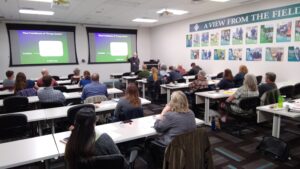
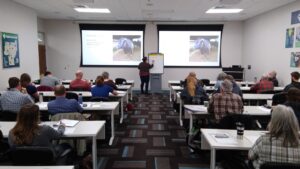
This workshop, titled Nutritional management of pasture raised animals, featured three content area specialists (April 29th 2019 workshop). A Pasture Program Coordinator from the University of Vermont spoke about pasture vs. confinement systems. An extension professor from the University of Vermont discussed forage quality of plants and weeds and an Research conservationist from NY NRCS discussed the nutritional needs and challenges of animals raised on pasture as well as multi species grazing. An engaging group discussion wrapped up the workshop. Several attendees offered some specific take away points they learned from the workshop. Some of those points included: urea/ammonia excretion when animals are on high quality pasture, the digestibility of forages at different stages of growth, the importance of non-protein carbohydrates, what is in forage (stems, leaves) and how to get the most nutritional value out of it, and taking a selective forage sample for analysis rather then a random sample. Some action steps that were discussed included: determining the goals the producer has to understand what type of management system would fit best for the operation (this includes walking through some feed calculations) and taking a selective forage sample for testing to understand the nutrition an animal is receiving. Questions were raised about where to send samples to, and while Dairy One was mentioned and is a well known lab in the New England region to send to for testing, the Project Director provided the names of several other labs in the May correspondence email. 57 persons registered and 28 attended. 18 ag service providers and 10 farmers. 21 persons completed on-site evaluations. Seven (7) reported an increase to maximum understanding in knowledge of the factors that help determine the use of a pasture vs. confinement based system. Fourteen (14) reported at least a moderate increase in knowledge of the supplementation needs of animals raised on pasture. Five (5) reported an increase to considerable knowledge in multi-species grazing while an additional six (6) reported a considerable increase in understanding forage quality components and nutrient composition of grasses, legumes and weeds. All respondents reported that they plan to continue learning about the nutritional needs of animals raised on pasture. 16 persons said they plan to integrate these topics into their everyday work, while five (5) reported that they were already integrating these topics into their work.
450 people (agricultural service providers and farmers) receive an announcement describing the field training workshops planned for year 2 of the Tri-State SARE professional development project; Nutrition's Role in Sustainable Livestock Production Practices. The announcement includes an invitation to provide feedback to the Project Director and the opportunity to register for one or all the workshops. Moving forward throughout year 2, planned workshops will be promoted and advertised on the project website (www.meatystems@uconn.edu) and with the help of agricultural service provider publications.
450
562
April 30, 2019
Completed
April 16, 2019
An announcement announcing the Tri-State SARE field training workshops was sent to the Tri-State Project email list (562 recipients) in mid-April 2019. The workshops are slated for May, June and July. One workshop will be held in each of the respective states (CT, MA, RI). The announcement provided the dates and topics of the three workshops as well as a link to register for any or all of the workshops. Moving forward throughout the remainder of the year a reminder email was sent approximately 1 to 2 weeks in advance of each workshop to all those who registered. All of the announcements sent via the listserv were also posted to the meatsystems website. The SARE project advisory group was also asked to share the information about the workshop with those whom they know would be interested in attending. 2019 field workshops
30 participants attend at least one of three field training workshops – one to be held in each state - that will highlight the recommended practices taught in the classroom workshops, including grass and weed identification as well as pasture walks and farm tours allowing participants to visually see a variety of feeding methods. This will allow for continued learning and further discussion about the topic and concepts learned in the classroom.
30
18
35
July 31, 2019
Completed
July 19, 2019
1st Field Training Workshop UMASS Field training May 15 2019 agenda
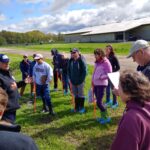
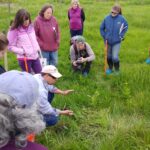
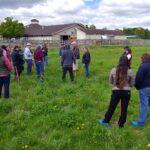
This workshop focused on different aspects of pasture management. The workshop was led by Dr. Masoud Hashemi, an Extension Professor at UMass and Bob Skalbite, the Farm Manger at UMass. The workshop covered plant ID including both common grasses and legumes found in New England pastures. Other topics covered included the use of a pasture stick, discussion of stockpiling concepts and soil sampling, testing, and interpretation of results. All participants were able to take home a pasture stick for their personal use that was donated to the project from NRCS offices in CT, MA and RI. All participants were engaged and asking questions before we got into the field, while in the field and again at the end of the workshop just before on-site evaluations were completed. 22 persons registered and 21 attended. 12 ag service providers and 9 farmers. 13 persons completed on-site evaluations. All reported a moderate to considerable increase in the ability to identify pasture grasses and how to use a pasture stick in the field. Most had only minimal knowledge of these topics prior to the workshop. 12 of the 13 participants reported having considerable knowledge of taking a soil sample and submitting it for analysis after the completion of the workshop. With the exception of one participant already using the skills learned in the workshop, all participants plan to utilize the skills and continue learning on the topics covered.
2nd Field Training Workshop RI field training june 12 2019 agenda
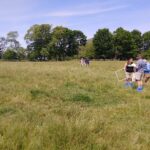
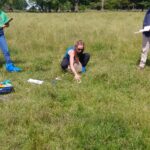
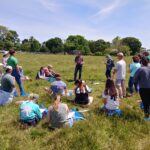
This workshop featured two speakers both from URI. Dr. Justine Deming discussed and taught plant ID through hands on demonstrations. She also spoke about the different types of grazing systems and focused her talk on continuous grazing as that was what the farm utilizes. She taught two different methods to determine pasture management in relation to forage maturity. The quadrat method and the use of a pasture stick were both discussed in the workshop. All attendees had an exercise to work through to help put the techniques taught into practice. All participants were able to take home a pasture stick for their personal use that was donated to the project from NRCS offices in CT, MA and RI. Dr. Andrew Radin discussed soil and walked the participants through the results of a soil health assessment that had been performed by the farm. He also discussed the proper techniques to use when taking a soil sample and how to test for and look at soil compaction. 21 persons registered and 24 attended. 11 ag service providers and 4 farmers and 9 students from URI. 15 persons completed on-site evaluations. All reported a moderate to considerable increase in the ability to identify pasture grasses and how to use a pasture stick in the field. Most had only minimal knowledge of these topics prior to the workshop. After the workshop, 13 participants indicated that they had moderate to considerable understanding of the concepts and principles of healthy soil. 11 participants said they had moderate to considerable understanding of taking a soil sample and sending it out for analysis after the workshop, while another 2 said they had minimal understanding after and a non-existent understanding at the start of the workshop. All participants reported that they plan to use the information learned and would like to learn more about these topics in the future.
3rd Field Training Workshop CT field training July 19 2019
This workshop focused on topics surrounding pasture management and infrastructure. The workshop was led by three speakers; James Hyde, State Agronomist for NRCS CT (and a member of the advisory group), Dr. Karl Guillard from UCONN and Dr. Wade Elmer from the CT Agricultural Experiment Station. Discussions throughout the workshop included: soil health and the importance of earth worms, common weeds found in pasture and how to identify and control them and fencing systems for pasture (specifically electric). All participants were able to take home a pasture stick for their personal use that was donated to the project from NRCS offices in CT, MA and RI. 23 persons registered and 30 attended. 22 ag service providers and 9 farmers. 14 persons completed on-site evaluations. 13 reported a moderate to considerable increase in the ability to identify weeds commonly found in pastures while 1 reported minimal but had non existent understanding prior to the start of the workshop. After the workshop, 13 participants indicated that they had moderate to considerable understanding of the concepts and principles of healthy soil, an increase from before the workshop. 12 participants said they had considerable understanding of taking a soil sample and sending it out for analysis after the workshop, while another 2 said they had moderate understanding after. Most participants had some knowledge of this prior to the workshop. All participants reported that they plan to use the information learned and would like to learn more about these topics in the future. 2 participants said they were previously integrating some of this information into their everyday work.
30 participants receive frequent updates about the project and will discuss and share questions, challenges, successes and progress towards action steps via the mode the group has determined will work best.
30
31
41
September 30, 2019
Completed
September 05, 2019
The Project Director started the first monthly email correspondence with the group in February 2019, after the first classroom workshop was held. This correspondence was sent to those who participated in any of the 2018 or 2019 workshops as well as to the project advisory group. The correspondence included a link to the power point presentations from the February workshop, in addition to the Penn State Agronomy Guide which was mentioned several times during the workshop. Also included were two interactive links that discussed pasture plants and weeds (University of Arkansas Extension) and soil health (SARE). The group was encouraged to provide feedback and comments of any sort to the rest of the group and the Project Director.
The second monthly correspondence email sent in March, reminded everyone that the power point presentations and worksheets from the March workshop had been posted to the project website. Also posted on the website was a grazing plan workbook for participants to utilize if they wished. A website was provided that had informational videos on watering and fencing systems for rotational grazers. Also provided was slides from one of the project's advisory group members which showed example layouts for people using a rotational grazing system. A book written by a well known grazing consultant in New England was also shared for participants further reading, if interested.
The third monthly correspondence email sent in early May, informed everyone that the power point presentations from the April workshop were available for viewing on the project website. Also provided was an extensive article on multi-species grazing, several forage testing laboratories that forage sample could be sent to for analysis, and a link to "On Pasture" a web resource with articles updated weekly pertaining to raising animals on pasture.
The monthly correspondence email sent in June provided participants who are looking for places to purchase hay with a website that would connect them with different growers/sellers in any state they were looking for. An article was also included that provided many supporting details to much of the topics that have been covered thus far in the project. Also included was a link to the soil testing laboratories at each of the three universities.
In July, the Project Director provided participants with information about several specific topics that came up during the June workshop. One article outlined the importance of soil pH while another article outlined an additional method to determine forage yield (quadrat method). A couple of articles on the use of a pasture stick were also included.
The monthly correspondence email in August provided some supporting documents to the conversations that were had at the last workshop in July. There was some discussion around common weeds found in pasture as well as the importance of earthworms on soil health. A question was raised about the safety of birdsfoot trefoil for equine consumption at the workshop as well. The Project Director reached out to several extension personnel to confirm the safety and an article was provided for further reading. Those who received a Certificate of Participation this year were also recognized.
In September, the Project Director provided the group with the Reference Guides that several participants in the first workshop of 2019 mentioned would be helpful to service providers and farmers. The director worked with several people within each of the three states (CT, MA and RI) to develop a list of agricultural businesses that provide services for those topics discussed in the workshop and beyond. For example, rental equipment dealers, hay suppliers and soil testing labs were just a few of many services listed. The guides were provided via email and are also housed on the project website. The director also included some information for those who may be interested in a pasture walk taking place on a livestock farm in Lancaster MA.
All participants from the 6 workshops respond to a follow-up survey from the Project Director. Agricultural service providers will report on actions taken to teach and advise farmers using new knowledge and skills from the workshops conducted in year 2 while farmers will report on what meaningful changes they have implemented on their farm. Both are expected to give input about future training needs.
30
13
20
December 31, 2019
Completed
December 04, 2019
The advisory group members provide feedback and advise the project director via conference calls, email communication and telephone calls. This will help to determine the specific training and educational needs of those involved, as it relates to the feedback received in the questionnaire forms filled out at all workshops in year 1 and 2 of the project. Topical emphasis, project curricula, project structure and training tools will be discussed. This group will also be consulted throughout the year when feedback on workshops and suggestions for improvement are being solicited.
11
11
September 30, 2019
Completed
September 03, 2020
The project advisory group was contacted in January 2020 and provided with an announcement that listed all three classroom workshops for the upcoming year. They were asked to pass the announcement along through their outlets and with those who may be interested in attending. In March, the project director touched base with each member in an effort to determine their interest to continue as an advisory group member in the 2020-2023 Tri-State SARE PDP project. Each member was also provided with the results of the needs assessment sent to the project listserv in preparation for determining the project's focus in 2020-2023. The project director, via email or telephone had a conversation with each advisory group member to gather thoughts and feedback before beginning to work on the proposal. In April, the project director sent a project update to all group members discussing the project changes due to the COVID-19 pandemic. The update also included information about the 2020-2023 proposal being submitted. In June, the Project Director provided another update on the revised plans for summer programming and mentioned that the 2020-2023 proposal was resubmitted with some minor edits. It was also mentioned that once approved, the Project Director would provide a copy of the final plan of work. The Project Director sent an email to the advisory group in September updating them on the completion of the 2020 workshops in addition to providing updates for the future. It was mentioned that the 2020-2023 Tri-State SARE project proposal was accepted and that the new project will start October 1st 2020. The Project Director will be reaching out to all members of the advisory group as planning for the next grant project begins.
450 people (agricultural service providers and farmers) receive an announcement describing the classroom workshops planned for year 3 of the Tri-State SARE professional development project; Nutrition's Role in Sustainable Livestock Production Practices. The announcement includes an invitation to provide feedback to the Project Director and the opportunity to register for one or all the workshops. Moving forward throughout year 3, planned workshops will be promoted and advertised on the project website (www.meatystems@uconn.edu) and with the help of agricultural service provider publications.
450
543
January 31, 2020
Completed
January 14, 2020
An announcement for the three classroom workshops planned for 2019 was sent to the entire Tri-State Project's email list in mid-January 2020. Much like year 2 of the grant, the three classroom workshops were planned for February, March and April and were held from 8:30 am to 1 pm at Farm Credit East in Enfield, CT. This workshop format seemed to be well received by many attendees. Each workshop has specific topics of focus and are structured in such a way that the first built on the second and the second on the third following a logical sequence. The workshops can also be attended as stand alone workshops, in the event someone felt they need training in only one specific area. The announcement provided the dates and topics of the three workshops as well as a link to register for any or all of the workshops. 2020 Workshop Flyer
Moving forward throughout the year a reminder email was sent approximately 1 to 2 weeks in advance of each workshop to all those who registered. In addition to the reminder details, the email also provided the names of the speakers and a short biography of each. All of the announcements sent via the listserv were also posted to the meatsystems website.
A series of three half day classroom workshops will be held in a central location. These workshops will allow for the increase of knowledge and skills in livestock nutrition, as it relates to sustainably feeding animals. Specific focus will be on pasture management and infrastructure, building on the concepts learned in year 2. 30 participants (agricultural service providers and farmers) will attend each classroom workshop. At each workshop, participants will engage in group discussions to generate ideas for teaching and advising farmers about the content learned in the workshop. Agricultural service provider participants will develop at least one action step to help farmers with this area of nutrition, while farmers will be asked to determine what of the concepts learned can apply to their own situation. All participants will also be asked to respond to a questionnaire to assess their learning at the conclusion of each workshop.
30
28
28
July 31, 2020
Completed
April 06, 2020
First Classroom Workshop Feb 10th agenda
This workshop, titled Pasture Renovation and Weed Management, featured two content area specialists (Feb 10th workshop). An Extension Professor from the University of Vermont spoke about pasture renovation and weed management. A Consultant from King's AgriSeeds discussed forage species selection and the equipment needed for seeding. A group discussion, held after the presentations was constructive in developing actions steps that may be taken by agricultural service providers as well as farmers. Action steps included adding to the resource guides put together in the second year of the project to include the conservation districts and other agencies that have seeding equipment that can be rented. It was discussed that this could be seen as a sustainable approach in the farming/agricultural community. With the equipment being costly and it's infrequent use on any one farm, there may be possibility for farmers in certain areas to pool their resources and share equipment. Another action step mentioned was to find out some more information about the costs to renovate one acre of pasture. A few service providers from NRCS mentioned that the price would vary based on whether it was a partial reseeding or a complete renovation but that a local NRCS office may be able to help producers get a better idea of costs. One farmer attendee mentioned that they were going to take a soil test to determine the soil pH. After the results come back, he plans to apply lime to his fields if results show that lime application would be favorable. New this year, the project utilized Poll Everywhere to conduct the on site evaluations/surveys in the classroom. Through the use of cell phones with texting capabilities, the participants were engaged in a much more interactive process to help determine their knowledge of the topics presented both before and after the presentations. This format seemed to be well received by the group as no one participating asked for the alternative, a paper evaluation. This method of polling seems to provide greater and more complete response rates over the previous paper evaluations. 43 persons registered and 37 attended. 13 ag service providers, 18 farmers and 6 students. 27 persons completed on-site evaluations. 14 reported an increase in understanding of how to select a forage species that meets the conditions/intended needs of the pasture, where 8 reported a nonexistent understanding of this topic prior to the start of the workshop. 13 reported a moderate increase in knowledge in how to control and manage weeds in a pasture. 14 reported an increase in knowledge in the area of timing and land preparation needed for pasture renovation. 21 reported that they plan to continue learning about renovating pasture and managing weeds. 16 persons said they plan to integrate these topics into their everyday work, while 4 reported that they were already integrating these topics into their work.
Second Classroom Workshop March 23rd agenda
*Due to the COVID-19 pandemic, this in person classroom workshop was converted to a WebEx webinar* This workshop, titled Grazing Systems, featured two content area specialists (March 2020 workshop). A Professor from the University of Rhode Island provided information on grazing systems and the types of grazing systems utilized in the tri-state region. A Professor (and farmer) from Yale School of Forestery discussed silvopasture. Because the workshop was held as a webinar the group discussion and evaluation was a bit different from normal. Each speaker took questions after their presentation allowing for interaction. The evaluation questions were presented through Slido during the webinar, with fairly high participation numbers. 40 persons registered for the classroom workshop and 21 joined the webinar. 13 ag service providers and 8 farmers. 14 persons completed the evaluation. 11 of the 14 respondents indicated they had no or minimal understanding of what defines silvopasture before the start of the webinar while 10 indicated they have moderate or considerable understanding after the webinar. 11 of the 14 respondents indicated that after the webinar they had considerable knowledge in what defines a grazing system and what is needed within one. When asked what action steps the participants planned to take as a result of participating in the webinar, many said that they plan to continue to learn more about and talk with farmers about silvopasture, plan useful lane ways in their existing paddocks and utilize pasture according to grass height rather then tradition or convenience. The webinar allowed us to continue our workshops that otherwise could not have been held due to COVID restrictions. This workshop was also recorded. The recording is available on the project website.
Third Classroom Workshop April 6th agenda
*Due to the COVID-19 pandemic, this in person classroom workshop was converted to a WebEx webinar* This workshop, titled Extending the Grazing Season, featured three content area specialists. An Extension specialist from the University of Massachusetts provided information on spring and fall grazing. An Extension specialist from the University of New Hampshire spoke about stockpiling and a professor from Penn State University discussed grazing cover crops to extend the grazing season. Because the workshop was held as a webinar the group discussion and evaluation was a bit different from normal. Each speaker took questions after their presentation allowing for interaction. The evaluation questions were presented through Slido during the webinar. 52 persons registered for the classroom workshop and 29 joined the webinar. 20 ag service providers and 9 farmers. 22 persons completed the evaluation. 14 respondents indicated they had no or minimal understanding of managing fall grazing of perennial pasture before the start of the webinar while 15 indicated they had moderate or considerable understanding after the webinar. 17 respondents indicated they had no or minimal understanding of the stockpiling concept before the start of the webinar while 15 indicated they had moderate or considerable understanding after the webinar. 12 respondents indicated that prior to the webinar, they had a minimal understanding of the benefits of grazing cover crops while 15 respondents had moderate to considerable knowledge after the webinar. When asked what action steps the participants planned to take as a result of participating in the webinar, one respondent said they plan to update their fact sheets for farmers, many of the respondents mentioned their plans to incorporate annuals into their pastures, and another respondent plans to talk with farmers about preparing for winter stockpiling. The webinar allowed us to continue our workshops that otherwise could not have been held due to COVID restrictions.
450 people (agricultural service providers and farmers) receive an announcement describing the field training workshops planned for year 3 of the Tri-State SARE professional development project; Nutrition's Role in Sustainable Livestock Production Practices. The announcement includes an invitation to provide feedback to the Project Director and the opportunity to register for one or all the workshops. Moving forward throughout year 3, planned workshops will be promoted and advertised on the project website (www.meatystems@uconn.edu) and with the help of agricultural service provider publications.
450
420
April 30, 2020
Completed
March 27, 2020
An announcement announcing the Tri-State SARE field training workshops was sent to the Tri-State Project email list in March 2020. The workshops are slated for June, July and August. One workshop will be held in each of the respective states (CT, MA, RI). The announcement provided the dates and topics of the three workshops as well as a link to register for any or all of the workshops. Moving forward throughout the remainder of the year a reminder email was sent approximately 1 to 2 weeks in advance of each workshop to all those who registered. All of the announcements sent via the project email list were also posted to the project website. It was decided in May that the summer field workshops would be converted to virtual training workshops. Another announcement was sent to the Tri-State Project email list in May and June regarding those changes. 2020 field workshops
30 participants attend at least one of three field training workshops – one to be held in each state - that will highlight the recommended practices taught in the classroom workshops. This will allow for continued learning and further discussion about the topic and concepts learned in the classroom.
30
12
25
August 31, 2020
Completed
August 18, 2020
*Due to the COVID-19 pandemic, all field workshops were converted to virtual training workshops using the WebEx platform* The originally scheduled July workshop in Rhode Island was cancelled and information on other programming (UMass webinar series on forage and grazing as well as NOFAMass workshops) taking place in our area was provided relating to the topics addressed during the project year. The year end survey asked participants if they involved themselves in any of these other educational opportunities.
First field training workshop June 10th agenda
This workshop was held at Stone Hill Farm in Plainfield, CT. The workshop highlighted the 100% pasture raised/grass fed beef herd owned by Dan and Jennie Kapszukiewicz. Jennie led the virtual training via videos, pictures and power point slides. The topics she covered during the workshop included: recording keeping, fencing/equipment, forage selection, their pasture rotation methods, resting periods, supplemental feed, soil and forage testing, winter management and their future plans. All participants were able to submit questions in advance of the webinar, allowing Jennie to tailor the presentation to those who were registered in advance. 32 persons registered and 18 attended. 13 ag service providers and 5 farmers. 9 persons completed the workshop evaluation conducted via the Slido platform. 5 of 9 participants reported a considerable increase in the importance of record keeping for pasture management. 7 of 9 respondents reported moderate to considerable understanding of the "tight and tall" grazing method after the completion of the workshop. Most only having nonexistent to minimal understanding prior to the workshop. 8 of the 9 respondents stated they have or plan to integrate some of the concepts learned into their everyday work and 7 of the 9 respondents said that they found the virtual workshop to be effective in replacing a hands on, in person field workshop. 7 respondents also provided at least one action step they plan to take after being part of the workshop. The webinar was recorded and the recording was made available on the project website as well as on the UConn Extension YouTube channel.
Second field training workshop August 18th agenda
This workshop was held at the UMass Agricultural Learning Center in Amherst, MA. The workshop was led by Nicole Burton, advisory group member and instructor at the Stockbridge School of Agriculture. Nikki led the virtual training on Silvopasture via power point and many pictures. The topics covered during the workshop included: intro to silvopasture, tree considerations and livestock considerations. All participants were able to submit questions in advance of the webinar, allowing Nikki to tailor the presentation to those who were registered in advance. 44 persons registered and 19 attended. 12 ag service providers and 7 farmers. 14 persons completed the workshop evaluation conducted via the Slido platform. 13 participants reported a moderate to considerable increase in the steps to take when establishing a silvopasture. 7 of those participants had minimal understanding prior to the start of the workshop. All respondents (14) reported moderate to considerable understanding of how to protect the trees in a silvopasture after the completion of the workshop. Most only having minimal understanding prior to the workshop. 13 of the 14 respondents stated they have or plan to integrate some of the concepts learned into their everyday work and 13 of the 14 respondents said that they found the virtual workshop to be effective in replacing a hands-on, in-person field workshop. 12 respondents also provided at least one action step they plan to take after being part of the workshop. The webinar was recorded and the recording was made available on the project website as well as on the UConn Extension YouTube channel.
30 participants receive frequent updates about the project and will discuss and share questions, challenges, successes and progress towards action steps via the mode the group has determined will work best.
30
34
33
September 30, 2020
Completed
August 27, 2020
The Project Director started the first monthly email correspondence with the group in February 2020, after the first classroom workshop was held. This correspondence was sent to those who participated in any of the 2018, 2019 and 2020 workshops as well as to the project advisory group. The correspondence included a link to the project website so that those who were interested could view the February workshop presentations. In addition, information was shared about bale grazing, soil pH and liming, and the UMass Extension Weed Herbarium. Some information was also shared about an upcoming no-till workshop taking place in Massachusetts. The group was encouraged to provide feedback and comments of any sort to the rest of the group and the Project Director. The Project Director sent a correspondence in both March and April with follow up information and sources to check out what was mentioned and discussed in the March and April classroom webinars. In May, the Project Director sent information to the entire group about the virtual field training that was going to take place in June. The email also included the link to another webinar series taking place during the summer that directly related to the educational topics covered in the project's programming this year. In June, the correspondence included the information (video recording and power point) from the first virtual workshop as well as some software programs available to develop a grazing management plan. Also included in the correspondence was information regarding the remainder of the planned summer programming for the Tri-State project. In July, information was shared about the upcoming August virtual field training. In addition to some other virtual learning taking place in our region. Information about composting and fencing was also shared, as those were topics of discussion during the workshops. In August, information was shared about the virtual workshop that was held in addition to some corona virus information and assistance for agriculturists. The project director also mentioned the names of those who received certificates and the plans for the Tri-State SARE project moving into 2021.
All participants from the 5 workshops respond to a follow-up survey from the Project Director. Agricultural service providers will report on actions taken to teach and advise farmers using new knowledge and skills from the workshops conducted in year 3 while farmers will report on what meaningful changes they have implemented on their farm. Both are expected to give input about future training needs. Note: Milestone #8 reflects on the content/training from year 3.
30
15
16
December 31, 2020
Completed
November 04, 2020
The Project Director distributed a follow up survey to both the service providers as well as the farmers who participated in at least one of the five workshops/webinars in 2020. The survey was anticipated to take about 5 to 8 minutes of time and the participants were given one month to respond (October 6th - November 4th). The follow up survey created for the service providers was distributed to 38 people, while the follow up survey created for farmers was distributed to 35 people. Responses were received from 16 service providers and 15 farmers, an overall response rate of 42%. Data from the surveys is reported in the performance target section.
Milestone activities and participation summary
Participation summary:
Learning Outcomes
YEAR 1
Cumulatively, over the 6 workshops held in 2018, 45 participants reported changes in knowledge, skills and/or attitudes as a result of their participation in the workshops as reported by the on-site evaluation forms. The evaluation forms asked them to report changes in knowledge, skills or attitudes and also to tell us whether they intended to use this knowledge gained from this project in their work with farmers.
Key areas in which the participants reported a change in knowledge, attitudes, skills and/or awareness on evaluation forms completed at the workshop are as follows:
-Nutritional requirements of animals and how nutrition impacts animal health
-Sustainable feeding practices
-Purpose of and how to body condition score pigs, goats, sheep and cattle
-Parasite control through proper nutrition and rotational grazing
-Role of physiological stage on nutritional needs of an animal
-How to perform FAMACHA scoring on sheep and goats
-How to perform a fecal egg count
-Importance of testing forages and how to sample them for analysis
The classroom workshops allocated 30 to 40 minutes for a group discussion following the presentations. The group discussion allowed for conversation regarding what action steps the service providers and farmers in the room could use in their day to day work. It also allowed for them to mention what topic areas they want further instruction in and what other tools would be helpful to them in their daily work. All discussions to date have been very engaging.
YEAR 2
Cumulatively, over the 6 workshops held in 2019, 65 participants reported changes in knowledge, skills and/or attitudes as a result of their participation in the workshops as reported by the on-site evaluation forms. The evaluation forms asked them to report changes in knowledge, skills or attitudes and also to tell us whether they intended to use this knowledge gained from this project in their work with farmers.
Key areas in which the participants reported a change in knowledge, attitudes, skills and/or awareness on evaluation forms completed at the workshop are as follows:
-The fundamentals of pasture plants
-The role that soil plays in forage and pasture quality
-Caring for existing pasture
-How to reseed new pasture
-Managing forage quality through grazing
-Use of a pasture stick
-When to employ the use of pasture vs. confinement system
-Forage quality and nutrient composition of grasses and legumes
Again this year, the classroom workshops allocated 30 to 40 minutes for a group discussion following the presentations. The group discussion allowed for conversation regarding what action steps the service providers and farmers in the room could use in their day to day work. It also allowed for them to mention what topic areas they want further instruction in and what other tools would be helpful to them in their daily work. All discussions have been engaging, allowing for service providers to understand the farmers perspective and vice versa.
YEAR 3
Cumulatively, over the 5 workshops held in 2020, 74 participants reported changes in knowledge, skills and/or attitudes as a result of their participation in the workshops as reported by the on-site evaluation forms. The evaluation forms asked them to report changes in knowledge, skills or attitudes and also to tell us whether they intended to use this knowledge gained from this project in their work with farmers.
Key areas in which the participants reported a change in knowledge, attitudes, skills and/or awareness on evaluation forms completed at the workshop are as follows:
-Improvement of pasture (when renovation is necessary, the time and land preparation for renovation)
-Selection of a forage specie that meets conditions and intended needs of the pasture
-The control and management of weeds in a pasture
-Grazing systems (defining one and what is needed within one, selecting the system that best fits a situation)
-Silvopasture (what defines one, steps to take in creating one, how to manage the trees, forage and animals in a synergistic way)
-Management of pasture during the 'summer slump'
-Management of pasture in the fall months (adequate resting period, stockpiling)
-The benefits of using cover crops in a pasture/grazing system
-Important concepts of pasture raised livestock (year around grazing, culling animals, soil health)
This year, all of the workshops (aside from the first in February) were web based. This provided for a unique situation when it came to group discussion. Participants were allowed to submit their questions in advance of the webinars in an effort to have them answered by the presenter during the presentation. There was also time built into the webinar for Q and A. Participants would submit their questions in the chat box and a moderator read the questions to the presenter so that they could be answered. The on-site evaluation (through Slido) allowed participants to report what action steps they planned to take as a result of participating in the workshop.
**PLEASE NOTE: the on-site evaluations are anonymous and therefore the numbers of service providers and farmers reported above is a best estimate of the project team. We presume that all attendees noted at some point throughout the project that they have increased/verified their knowledge/skills/awareness in some area(s) and plan to use that knowledge and skills in their work. The total number reflected above are the unique number of individual service providers and farmers who attended at least one of the 17 workshops the project hosted in 2018, 2019 and 2020**
Performance Target Outcomes
Performance Target Outcomes - Service Providers
Target #1
25 agricultural service providers who learn through this project will provide education and assistance (e.g. workshops, meetings, individual consultations, articles, fact sheets) about the recommended sustainable livestock production practices to 200 farmers in CT, MA and RI who manage 4,000 head of livestock (beef cattle, sheep, goats, pigs, chickens).
4,000 head of livestock (beef cattle, sheep, goats, pigs, chickens)
| Year 1 | Year 2 | Year 3 |
|---|---|---|
| 13 | 30 | 16 |
Year 1
In a follow up survey, the service providers were asked whether or not they have used or plan to use the following practices in their daily work with farmers.
-Monitoring livestock nutritional intake to optimize animal health and well-being
-Body Condition Scoring to assess nutritional status
-Sampling forage for nutritional analysis
-Interpreting forage analysis for feed management
-FAMACHA scoring to determine parasite load in small ruminants
-Fecal testing for parasite activity in small ruminants
Other actions taken that were noted by the service provider respondents included: pasture grass diversity and forage identification
Year 2
In a follow up survey, the service providers were asked whether or not they have used or plan to use the following practices in their daily work with farmers.
-Ability to properly identify pasture grasses and legumes
-Using a pasture stick as a forage management tool
-Soil sampling and testing to determine the health and needs of soil
-Determining when to employ the use of pasture vs. confinement based system
-Forage sampling and testing for nutritional analysis
-Use of NRCS web soil survey website
Other actions taken that were noted by the service provider respondents included: Weed ID, toxic plant ID, importance of good pasture management, nutritional quality of forage and how it applies to animal needs, quadrat method to estimate grazing.
Year 3
In a follow up survey, the service providers were asked whether or not they have used or plan to use the following practices in their daily work with farmers.
-Ability to determine when to completely renovate vs. improve an existing pasture
-Factors to consider when selecting a forage species
-Weed management within a pasture
-Understanding the different aspects of silvopasture including: tree, grass and animal management
-Assisting a farm in determining the best grazing system to employ
-Compensating for the 'summer slump' with the use of summer annuals
-Calculating the amount of forage needed for stockpiling
-Role cover crops play in a grazing plan
Other actions taken that were noted by the service provider respondents included: Appropriate pasture mixes for different environmental conditions, soil types, and topography and looking at Ph as a starting point for pasture improvement.
| Year 1 | Year 2 | Year 3 |
|---|---|---|
| 87 | 130 | 57 |
| Year 1 | Year 2 | Year 3 |
|---|---|---|
1,755 animals |
1,026 animals |
895 animals |
| Activity | Year 1 | Year 2 | Year 3 | Total |
|---|---|---|---|---|
| Curricula, factsheets and other educational tools | 2 | 5 | 5 | 12 |
| Consultations | 4 | 8 | 7 | 19 |
| On-farm demonstrations | 1 | 0 | 0 | 1 |
| Study circles / focus groups | 0 | 2 | 0 | 2 |
| Workshops and field days | 0 | 1 | 1 | 2 |
| YEAR 1 -Shared the BCS videos with students I teach YEAR 2 -I am a high school Vo-Ag teacher and used this content in lessons and plan to continue to develop curriculum with it -Discussions with stakeholders and the ability to point them to online resources -Shared information with co-workers who weren't able to attend the workshops -Used the information on my own farm as well -I am an instructor and used these in two of the UConn animal science classes I teach YEAR 3 - Selecting information as it fits for the unit at a Public High School Agriculture education program | 1 | 5 | 1 | 7 |
Year 1
6 months after the completion of year 1, the Project Director distributed a follow-up survey to the service providers and farmers who attended at least one of the six workshops held. The survey was created in Qualtircs and formatted in such a way that presented the questions based on the demographic chosen by the respondent. The survey was distributed via an email link to 39 total participants, 25 service providers and 14 farmers. 19 participants, 13 service providers and 6 farmers responded (49%) to the survey. We were interested in learning what workshops participants attended, what actions they had taken since the workshops, how they used the information learned, how many they were able to share the information with and how useful the body condition scoring videos created were to them.
1 (.07%) service provider who works with large ruminants (therefore the practices don't apply), said they have not and do not plan to use information about FAMACHA scoring or fecal testing in their work with farms. All other service providers who responded to the survey have implemented or plan to implement the best practices that were discussed in the 2018 workshops. 3 (23%) service providers have shared the importance of fecal testing for parasite activity, discussed the importance of sampling forage for analysis and have helped to interpret forage analysis results in their work with farmers. 5 (38%) service providers have shared the importance of monitoring nutrition to optimize animal health and well-being, while another 4 (31%) service providers plan to share this information with farmers when the opportunity arises. 5 (38%) of the service providers have integrated the use of body condition scoring to assess nutrition in their work with farms while another 3 (23%) plan to integrate this but haven't yet done so. 5 (38%) of the service provider respondents said that they have had the chance to watch the body condition scoring videos produced. 2 (15%) respondents stated that they were not aware of the videos, while another 3 (23%) stated they had not yet watched the videos but still plan to. 3 (23%) respondents chose not to answer the question. Of the service providers who watched the videos, 100% of them gave the videos the highest rating possible, noting that they are very useful in their daily work with farmers.
Year 2
4 months after the completion of the last workshop of 2019, the Project Director distributed a follow-up survey to the service providers and farmers who attended at least one of the six workshops held. The survey was created in Qualtrics and formatted in such a way that questions were presented to the respondent based on their demographics and the workshop(s) they attended. Therefore, not all survey respondents received all of the questions in the survey. The survey was distributed via email to 67 total participants, 36 service providers and 31 farmers. 43 participants, 30 service providers and 13 farmers responded (49%) to the survey. We were interested in learning what actions they had taken since the workshops, how they used the information learned, how many they were able to share the information with, how useful the resource guides were to them and why they did or did not decide to complete the requirements to receive the Certificate of Participation.
All service providers who responded to the survey have used or plan to use the best practices that were discussed in the 2019 workshops. 11 (37%) service providers have shared the information learned to properly ID pasture grasses/legumes. 9 (30%) service providers have shared information on the use of the following: a pasture stick as a forage management tool, soil sampling and testing to determine the health and needs of soil and the use of the NRCS web soil survey website. 6 (20%) service providers have used the information learned to understand when to employ a pasture vs. confinement based system. 10 (33%) plan to use the information they learned about forage sampling/testing for nutritional analysis while another 6 (20%) plan to use the soil sampling/testing information as well as the information about employing a pasture vs confinement based system. It was found that 9 of the 12 (75%) survey respondents did not receive the certificate due to time commitment (unable to attend all classroom workshops and at least one field workshop) rather then a lack of interest in obtaining it. Those who did receive the certificate and choose to answer the question said it makes them feel more qualified in their position when working with clients. 4 (13%) of respondents have already shared the resources guides with others while another 10 (33%) have not yet shared the guides but plan to. 4 (13%) respondents said they weren't aware of the resource guides. For those respondents, a link to all three guides were provided for their review.
Year 3
3 months after the completion of the last workshop of 2020, the Project Director distributed a follow-up survey to the service providers and farmers who attended at least one of the five workshops held. The survey was created in Qualtrics and formatted in such a way that questions were presented to the respondent based on their demographics and the workshop(s) they attended. Therefore, not all survey respondents received all of the questions in the survey. The survey was distributed via email to 73 total participants, 38 service providers and 35 farmers. 31 participants, 16 service providers and 15 farmers responded (42%) to the survey. We were interested in learning what actions they had taken since the workshops, how they used the information learned, how many they were able to share the information with, if they participated in any of the other suggested educational webinars and their thoughts and feedback on virtual learning.
9 (90%) respondents reported that they have shared or plan to share information about determining when to completely renovate vs. improve an existing pasture. 100% of the respondents have shared or plan to share information about factors to consider when selecting forage species and information about managing the different aspects of silvopasture. 7 (58%) respondents have shared information about weed management in a pasture while another 4 (33%) plan to share the information. An equal number of respondents (88%) have shared or plan to share information with farmers that will help assist them in determining the best grazing system for their situation. 10 (90%) of the respondents have shared or plan to share information about the role cover crops play in a grazing plan. 5 (45%) of the respondents said they plan to share information about calculating the amount of forage needed for stockpiling, while only 1 (9%) said they have shared the information. 3 (27%) of the respondents have not shared the information while another 2 (18%) said they need more information before sharing. It seems there is more room/a need for more education on this topic as this is a fairly unique practice in our region. Service providers and therefore, producers could use more education before deciding to employ the stockpiling concept. 6 (55%) respondents have already shared information about compensating for the summer slump while another 4 (36%) plan to share the information. It was found that 9 (69%) respondents either participated in or plan to watch the recordings of the other educational webinars suggested to them through the monthly correspondence emails. Only 1 (8%) respondent said they were not aware of the other educational webinars, while the remaining 3 (23%) said they did not participate in them. Also asked were questions pertaining to the virtual learning setting used this year and thoughts on virtual learning moving forward. 6 (55%) respondents ranked their level of satisfaction with the virtual learning environment as very good. 27% ranked their satisfaction as excellent while the remaining 9% thought the learning environment was average. No respondents selected fair or poor. 8 (73%) of the respondents stated that there was nothing that could be done to improve the virtual setting while the remaining 27% noted that more interaction and live visuals would have been helpful.
Overall
The only aspect of the target that was not achieved was the number of animals managed by the famers who were educated and advised by the service providers. The project reached 3,676 animals falling just short of the 4,000 head target. This shortcoming might be due to the variation in size of livestock farms in the tri-state area or the time of year that the service provider was interacting with the farmer based on the farms harvest schedule for their livestock. Also, in the last year of the grant many service providers were not doing on farm visits (due to COVID) and therefore may not have a clear idea of the number of head of livestock a farmer has when working virtually with them. The number of service providers participating in the project and the number of farmers who were educated and advised by those service providers exceeded the project target.
**PLEASE NOTE: the year end follow up surveys are anonymous and therefore the 59 service providers are not exclusively unique. We can say without doubt that 59 service providers have clearly indicated in the year end surveys that they have used the the knowledge and skills they learned through the project in their daily work**
Performance Target Outcomes - Farmers
Year 1
6 months after the completion of year 1, the Project Director distributed a follow-up survey to the service providers and farmers who attended at least one of the six workshops held. The survey was created in Qualtircs and formatted in such a way that presented the questions based on the demographic chosen by the respondent. The survey was distributed via an email link to 39 total participants, 25 service providers and 14 farmers. 19 participants, 13 service providers and 6 farmers responded (49%) to the survey. We were interested in learning what workshops participants attended, what actions they had taken since the workshops, how they used the information learned, how many they were able to share the information with and how useful the body condition scoring videos created were to them.
3 (50%) farmers have started or plan to start fecal testing for parasite activity within the next 6 months, while 4 (66%) farmers have started or plan to start sampling forage for analysis and additionally, interrupting the results. All farmers were either performing FAMACHA scoring or have started to since the workshops while another 4 (66%) have employed the technique of body condition scoring to asses nutritional status. 2 (33%) of the farmer respondents said that they have had the chance to watch the body condition scoring videos produced, an additional 2 (33%) respondents stated that they were not aware of the videos. 2 (33%) respondents chose not to answer the question.
Year 2
4 months after the completion of the last workshop of 2019, the Project Director distributed a follow-up survey to the service providers and farmers who attended at least one of the six workshops held. The survey was created in Qualtrics and formatted in such a way that questions were presented to the respondent based on their demographics and the workshop(s) they attended. Therefore, not all survey respondents received all of the questions in the survey. The survey was distributed via email to 67 total participants, 36 service providers and 31 farmers. 43 participants, 30 service providers and 13 farmers responded (49%) to the survey. We were interested in learning what actions they had taken since the workshops, how they used the information learned, how useful the resource guides were to them and why they did or did not decide to complete the requirements to receive the Certificate of Participation.
All farmers who responded to the survey have used or plan to use the best practices that were discussed in the 2019 workshops, unless they were already doing so prior to attending the workshop. 5 (38%) farmers plan to begin forage sampling and testing for nutritional analysis, while another 2 (15%) were already sampling and testing and 1 (7%) plans to begin sampling and testing moving forward. 3 farmers (23%) plan to: begin identifying pasture grasses and legumes, use the pasture stick as a management tool and begin soil sampling and testing to determine the health and needs of the soil. 9 (69%) farmers were already taking soil samples and another 8 (62%) started identifying pasture grasses and legumes after learning about it in the workshops. 3 (23%) farmers were already determining when they should employ a pasture vs confinement based system as well as using the NRCS web soil survey website while another 3 (23%) were looking for more information before they employed a pasture vs. confinement system. 3 (23%) farmers have since started using the NRCS web soil survey website. It was found that 5 of the 7 (71%) survey respondents did not receive the certificate due to time commitment (unable to attend all classroom workshops and at least one field workshop) rather then a lack of interest in obtaining it. Those who did receive the certificate and choose to answer the question said that learning is important to the success of their farm and the certificate helps motivate them to share what they have learned with others. 7 (54%) of respondents have already used or shared the resource guides with others while another 6 (46%) have not yet used or shared the guides but plan to.
Year 3
3 months after the completion of the last workshop of 2020, the Project Director distributed a follow-up survey to the service providers and farmers who attended at least one of the five workshops held. The survey was created in Qualtrics and formatted in such a way that questions were presented to the respondent based on their demographics and the workshop(s) they attended. Therefore, not all survey respondents received all of the questions in the survey. The survey was distributed via email to 73 total participants, 38 service providers and 35 farmers. 31 participants, 16 service providers and 15 farmers responded (42%) to the survey. We were interested in learning what actions they had taken since the workshops, how they used the information learned, how many they were able to share the information with, if they participated in any of the other suggested educational webinars and their thoughts and feedback on virtual learning.
6 (75%) of the respondents said that they plan to evaluate their pastures in such a way that helps them determine whether a complete renovation or improvement of existing pasture is appropriate. 1 (13%) respondent was already doing this while another 1 (13%) started doing this since the workshops. None of the respondents indicated that they need more information or that they don't plan on implementing this practice. An equal number of respondents (44% each) either plan to or were managing weeds within their pasture as a result of attending a workshop. 1 (11%) respondent said they started doing this since attending the workshop and none of the respondents indicated that they need more information or that they don't plan on implementing this practice. Over half (56%) of the respondents are now able to select the best forage species for the situation since attending a workshop. Another 3 (33%) plan to select the best forage species for the situation in the future and 1 (11%) was already doing this prior to the workshop. None of the respondents indicated that they need more information or that they don't plan on implementing this practice. An equal number of respondents (33% each) indicated that they were already, have started since the workshops or plan to start determining the best grazing system to employ on their farm. None of the respondents indicated that they need more information or that they don't plan on implementing this practice. 3 (50%) of the respondents now plan to use summer annuals to compensate for the summer slump, while 1 (17%) started doing this since the workshops. There seems to be a need for more information on this concept as 2 (33%) of the respondents are looking for more information. None of the respondents were employing this practice prior to the workshop. No respondents were employing the stockpiling method prior to attending the workshops. An equal number of respondents (17% each) said they plan to or have started doing these calculations since the workshops. 3 (50%) respondents said that they do not intend to use the stockpiling method on their farm, further reinforcing that this is not a common practice in our region. 5 (42%) respondents either participated in or plan to watch the recordings of the other educational webinars suggested to them through the monthly correspondence emails. 4 (33%) said they did not participate, while 1 (8%) plans to watch the recordings and 2 (17%) were not aware of the webinars. Also asked were questions pertaining to the virtual learning setting used this year and thoughts on virtual learning moving forward. 3 (27%) respondents ranked their level of satisfaction with the virtual learning environment as excellent. 36% each ranked their satisfaction as very good or average. No respondents selected fair or poor. None of the respondents elected to provide feedback on what could have been done to improve the virtual learning environment.
**PLEASE NOTE: the year end follow up surveys are anonymous and therefore the 34 farmers are not exclusively unique. We can say without doubt that 34 farmers have clearly indicated in the year end surveys that they have used the the knowledge and skills they learned through the project in their daily work**
Additional Project Outcomes
Year 1
In the first year of the project (2017-2018) four short videos were produced on the topic of body condition scoring. The four livestock species that were showcased included: beef cattle, goats, pigs and sheep. The videos were filmed during the field workshops and were created for the educational purposes of agricultural service providers and farmers, alike. Once finalized, the videos were shared with the entire Tri-State SARE listserv as well as each of the Universities involved in the project. About 3 weeks after they had been posted to the University of Connecticut's Extension YouTube channel, there had been 126 views. Combined, the four videos had over 1,200 twitter impressions in two weeks and reached over 450 people via Facebook. These videos will be useful educational tools for those involved in livestock production in Southern New England. All videos can be viewed at the following link: http://s.uconn.edu/bcs. As of April 2019 (5 months following the posted date) the videos have 231 views on YouTube.
Year 2
In the second year of the project, the Project Director put a Certificate of Participation in place for those attendees who met the requirements. (2019-cert.-of-participation-requirements). This year, the certificates are being used as a trial. The Project Director is looking to understand if participants perceive value in the certificate and are interested enough to complete the requirements. If this program is well received, the Project Director anticipates building on it, to help enhance the overall goal of the SARE project; modifying the program to a Certificate of Completion or Achievement in the future. At the first classroom workshop in 2019, it seemed that many attendees were interested and perceived value in it, with over 75% (21 people) saying that they planned to complete the requirements. At the conclusion of 2019, 62% of those who planned to complete the requirements (13 people - 5 service providers and 8 farmers) qualified for and received a Certificate of Participation. The Project Director plans to ask further questions surrounding the certificate to those who participated in the workshops this year, in order to determine what the certificate will look like moving forward.
In the second year, the Project Director also provided all year 2 participants with the opportunity to voice their thoughts and opinions through a year end questionnaire. They were asked for their thoughts on the time of day the workshops were held, if the monthly correspondence emails were useful to them, if they would participate in a certificate program moving forward and for topics of interest that they would like to learn more about. There was a 40% response rate. The feedback received will help determine the curriculum in year 3 of the grant and helped to reinforce the importance of corresponding with participants outside of the workshops.
A farmer from CT who attended a field training workshop, had this to say: "During the Umass field walk there was a demonstration plot of different pasture grasses. This was the best setup to visually see the grass in different stages of life. I am building a similar set up this year to watch the plants grow for better identification." Many participants have noted that they enjoy learning the concepts in the classroom and then secondarily have the ability to see it in a field situation so that they can visually understand how to take action. In this situation, a hands on environment helped this farmer understand what they could do on their farm to reinforce the concepts taught/learned in the workshop.
A participant in year 2 who completed the end of the year questionnaire, said: "Rachel [Project Director] does a great job of making it 'learnable'. The teachers we have had are great and hands on, can't be better"
In response to the Livestock Services guides that were sent via one of the monthly correspondence emails, a farmer replied to the Project Director saying: "Thank you very much. This information promises to be a time and money saver!"
A farmer participant in year 3 who completed the year end survey, commented: "There is no substitute for in person/on site workshops! But your online version was very well done, thank you." This is positive information for the project team as we begin planning the 2021 classroom workshops virtually.
Year 3
The third year of the project presented some challenges during to the COVID-19 pandemic. In-person classroom and field workshops were transitioned to virtual learning after the first workshop. The remaining 4 workshops were held virtually via Web-Ex webinars. While the 'lecture and Q&A session' style webinars were a good short term solution, the Project Director plans to further enhance the virtual learning environment in the future. At the conclusion of year 3, the Project Director distributed a series of virtual learning questions to those who have registered and/or attended at least one of the 17 workshops held between 2017-2020. The intention was to get an idea of what participants would want a virtual learning environment to look like. As a result of sending the survey, the project team now has a clear understanding of the ideal length of an online workshop, respondents comfort level of indoor vs. outdoor gatherings as well as the most important aspects of what a virtual learning environment contains. The project team plans to make the virtual learning more like interactive workshops rather than webinars. Presentations and Q&A will still be a part of the workshops but breakout rooms will also be utilized. The Project Director intends to allow for more interaction among the participants and also plans for them to use the data/numbers they 'bring with them' to help them apply the concepts taught.
SARE Outreach
2017-2018
Southern New England Livestock Conference - January 28, 2018. Set up a booth to promote NESARE as well as the Tri-State SARE Professional Development Project. Spoke with numerous attendees at this day long event, about the purpose and mission of SARE. 9 attendees opted to add their information to the SARE e-mail list.
CT NOFA Winter Conference - March 10, 2018. Information was available at the trade show, which promoted NESARE and the Tri-State SARE Professional Development project. The dates for the 2018 workshops had yet to be determined at that time, but information included the topics and areas of focus for the 3-year project.
Rhode Island Raised Livestock Annual Meeting - April 9, 2018. Provided outreach support and materials on the Tri-State SARE project for the trade show at the annual meeting. This was done in conjunction with the RI SARE State coordinator, who also handed out the project director's business cards. There was a lot of interest in the field training workshop that will be held at URI's Peckham Farm, date at that time was TBD.
Throughout the year the Project Director also worked to connect with and add several other classes of agricultural service providers to the listserv. Teachers from vocational agriculture high schools as well as local feed and farm supply stores throughout CT, MA and RI were provided with information about the Tri-State SARE program. They were encouraged to add their contact information to the project listserv, so that they could be kept abreast of planned workshops.
In a continued effort to reach further potential project participants, the Project Director has reached out to several new and beginning farmer organizations in CT, MA, RI. Organizations such as: New CT Farmers Alliance, Young Farmer Network of Southeastern New England, The Farm School (MA), the Agricultural Business Training Program (MA) and the New Entry Sustainable Farming Project have been very receptive and willing to promote and share the Tri-State project workshops with those involved in their organization.
2018-2019
CT Farm Bureau Annual Meeting - November 15, 2018. Information was available at the trade show, which promoted NESARE and the Tri-State SARE Professional Development project. A one page promotional flyer, describing the 2019 planned Tri-State workshop topics was available for those who were interested. A sign-up sheet for those who wished to add their contact information to the project listserv was also made available.
CT Pomological Society Conference: November 27, 2018. The CT State SARE coordinator provided outreach support and materials which promoted NESARE and the Tri-State SARE Professional Development project.
Small fruit and Veg Conference: January 7, 2019. The CT State SARE coordinator provided outreach support and materials which promoted NESARE and the Tri-State SARE Professional Development project.
CT Cut Flower Conference: January 8, 2019. The CT State SARE coordinator provided outreach support and materials which promoted NESARE and the Tri-State SARE Professional Development project.
CT Hop Growers Conference: January 12, 2019. The CT State SARE coordinator provided outreach support and materials which promoted NESARE and the Tri-State SARE Professional Development project.
CNLA Winter Symposium: January 24, 2019. The CT State SARE coordinator provided outreach support and materials which promoted NESARE and the Tri-State SARE Professional Development project.
Southern New England Livestock Conference: January 26, 2019. Set up a booth to promote NESARE as well as the Tri-State SARE Professional Development Project. Spoke with numerous attendees at this day long event, about the purpose and mission of SARE. 8 attendees opted to add their information to the SARE e-mail list.
The Northern Connecticut Agricultural Summit: March 9, 2019. The CT State SARE coordinator gave a presentation on the grant opportunities that SARE provides and provided outreach support and materials which promoted NESARE.
Ag Day at the Capitol: March 20, 2019. The CT State SARE coordinator provided outreach support and materials which promoted NESARE and the Tri-State SARE Professional Development project.
CT Dairy Conference: March 20, 2019. The CT State SARE coordinator provided outreach support and materials which promoted NESARE and the Tri-State SARE Professional Development project.
Rhode Island Raised Livestock Annual Meeting: May 6, 2019. Provided outreach support and materials on the Tri-State SARE project for the trade show at the annual meeting. This was done in conjunction with the RI SARE State coordinator, who also handed out the project director's business cards.
2019-2020
Connecticut Greenhouse Growers Association Workshop: October 16, 2019. The CT State SARE coordinator provided outreach support and materials which promoted NESARE at the trade show.
CT Farm Bureau Annual Meeting: November 21 2019. The CT State SARE coordinator provided outreach support and materials which promoted NESARE at the trade show.
CT Pomological Society Conference: December 3, 2019. The CT State SARE coordinator provided outreach support and materials which promoted NESARE at the trade show.
CT Small fruit and Veg Conference: January 6 2020. The CT State NSARE coordinator provided NESARE outreach support and materials at the trade show.
CT Cut Flower Conference: January 14, 2020. The CT State NSARE coordinator provided NESARE support and materials in a presentation.
CT Greenhouse Growers Association: January 15, 2020. The CT State NESARE coordinator provided NESARE support and materials in a presentation.
CT Hop Growers Conference: January 18, 2020. The CT State NESARE coordinator provided NSARE support and materials in a presentation.
CT Nursery and Landscape Association: January 23, 2020. The CT State NESARE coordinator provided NSARE support and materials in a presentation.
CT Tobacco Conference: February 25, 2020. The CT State NESARE coordinator provided NSARE support and materials in a presentation.
Northern CT Ag Summit: February 29, 2020. The CT State NESARE coordinator provided NSARE outreach support and materials at the trade show.
CT Christmas Tree Growers Association: March 7, 2020. The CT State NESARE coordinator provided NSARE support and materials in a presentation.
CT Dairy Conference: March 9, 2020:The CT State NESARE coordinator provided NESARE support and materials in a presentation.
